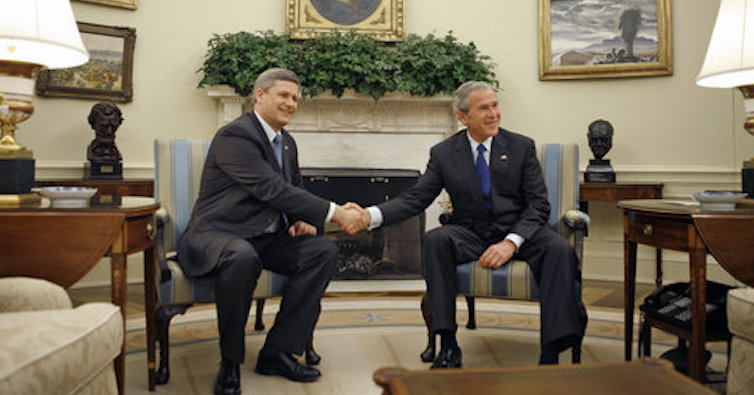Most observers of Canada-U.S. politics and the two countries’ unexpectedly fraught trade relationship would agree former prime minister Stephen Harper’s no-longer-secret visit to the White House on Tuesday is unlikely to do much good and has the potential to do harm.
What Harper, now just another private citizen in law if not in political influence, is trying to accomplish is difficult to say. For all we know, he’s just dropping over for covfefe with National Security Advisor John Bolton, President Donald Trump’s chief warmonger. The problem is, we have no idea. Neither does the government of Prime Minister Justin Trudeau, which was blindsided when U.S. officials inadvertently released the news.
It’s possible Harper himself has no idea. Divide and conquer tactics are not unknown to the Trump Administration, and if that’s what this is, Harper should know better than play into the president’s hands. Perhaps the romance of a White House visit just got the better of him.
Nevertheless, it’s difficult to imagine the hyper-partisan former head of Canada’s government is simply trying to assist the elected government of Canada to resolve the dispute the unpredictable and narcissistic president of the United States has thrust upon our two countries.
Given Harper’s history, and much of the current behaviour of the party he so recently led, it’s hard to believe he would put the interests of the country ahead of the interests of partisanship and the international neoliberal ideological movement his party is part of. The potential for partisan mischief with disastrous implications for Canada is real. Regardless, it’s not his call.
Perhaps Harper imagines that his role as the leader of the International Democrat Union — which has been sarcastically referred to in this space as the Neoliberal Internationale, owing to the adoption of much of the methodology if not the motives of the international communist movement of yore — gives him a legitimate role in this situation.
It most certainly does not. Harper is so distrusted in some quarters in this country that his efforts are likely to be no less divisive than his time in office, which is obviously no help in a situation where national solidarity is a likely precondition of success.
If you believe this is a moment Canadians should stand together — which even the Conservative Party’s Parliamentary Caucus seems to reluctantly accept as necessary — then Harper should cancel his trip. Would he do that? The answer to that question will tell us a lot.
Granted, a moment of national unity gives the Conservative Opposition led by the hapless Andrew Scheer not much to do to score points except lie about the prime ministerial swing set and make preposterous claims like Tory Finance Critic Pierre Poilievre’s pathetic argument that if Canada had a smaller deficit we could heap larger penalties on the heads of the Americans.
Regardless, it’s a well-established principle in diplomacy — the real kind, practiced by diplomats — that freelance negotiations of this sort have the effect of undermining any government’s position.
That is why in 1799, our neighbour to the south criminalized unauthorized negotiations with foreign governments, when a Quaker state legislator from Pennsylvania named George Logan sailed to France to try as a private citizen to end an undeclared war between France and the United States over the American failure to repay debts to France.
The efforts of the Philadelphia pacifist, a Democratic-Republican, seemed to work. This outraged the Federalists who controlled both houses of Congress. So, on Jan. 30, 1799, President John Adams signed the resulting bill into law.
The Logan Act, as it came to be known, says:
Any citizen of the United States, wherever he may be, who, without authority of the United States, directly or indirectly commences or carries on any correspondence or intercourse with any foreign government or any officer or agent thereof, with intent to influence the measures or conduct of any foreign government or of any officer or agent thereof, in relation to any disputes or controversies with the United States, or to defeat the measures of the United States, shall be fined under this title or imprisoned not more than three years, or both.
The interesting thing is that despite being little used, the Logan Act has remained on the books ever since — for the obvious reason that there is a real need to prevent such interventions, all the more so in the globalized world of the 21st century. Its mere presence is a useful reminder of the necessity of a state’s government holding a monopoly on diplomacy.
It resurfaces from time to time over the years, often in political rhetoric, as in the recent case of one of President Trump’s flunkies who got a little too close to the government of Russian President Vladimir V. Putin.
It would seem such a formalized prohibition is now needed in Canadian law too, since certain of our well-placed citizens are obviously disinclined to govern themselves appropriately.
This might or might not require a constitutional test or two before the courts, but a prohibition on unauthorized freelance diplomacy would seem to meet the Charter’s test of a reasonable limit prescribed by law that can be justified in a free and democratic society.
We could even imitate our neighbours and call it the Harper Act. Then no one could argue Harper’s time in Canadian politics passed without a single improvement for the country!
Seriously, if Harper wants to serve his country in the conduct of foreign affairs, he needs to wait to wait until he is asked by the elected government of the day.
This post also appears on David Climenhaga’s blog, AlbertaPolitics.ca.
Image: Paul Morse (The White House)
Like this article? Please chip in to keep stories like these coming.




